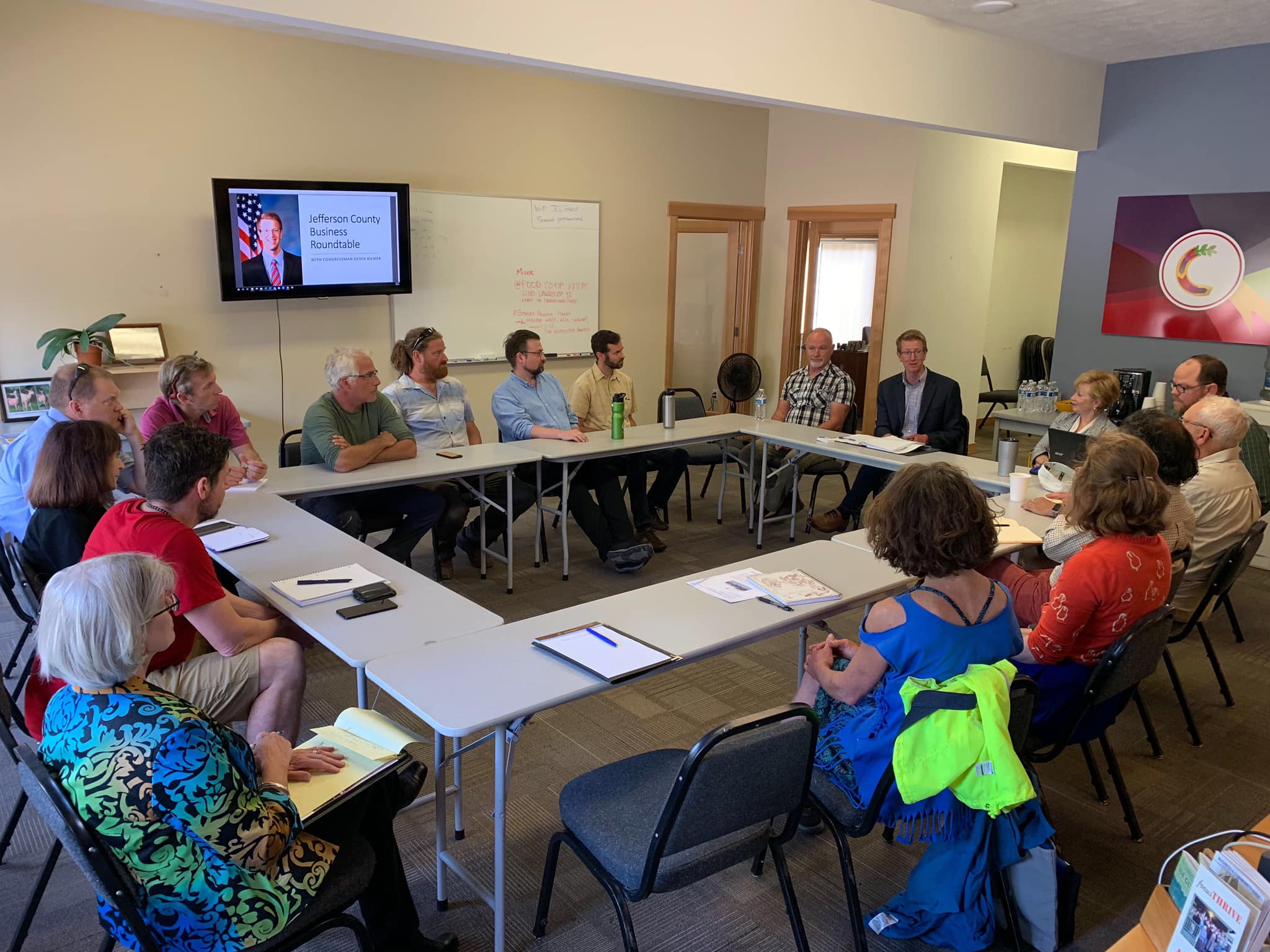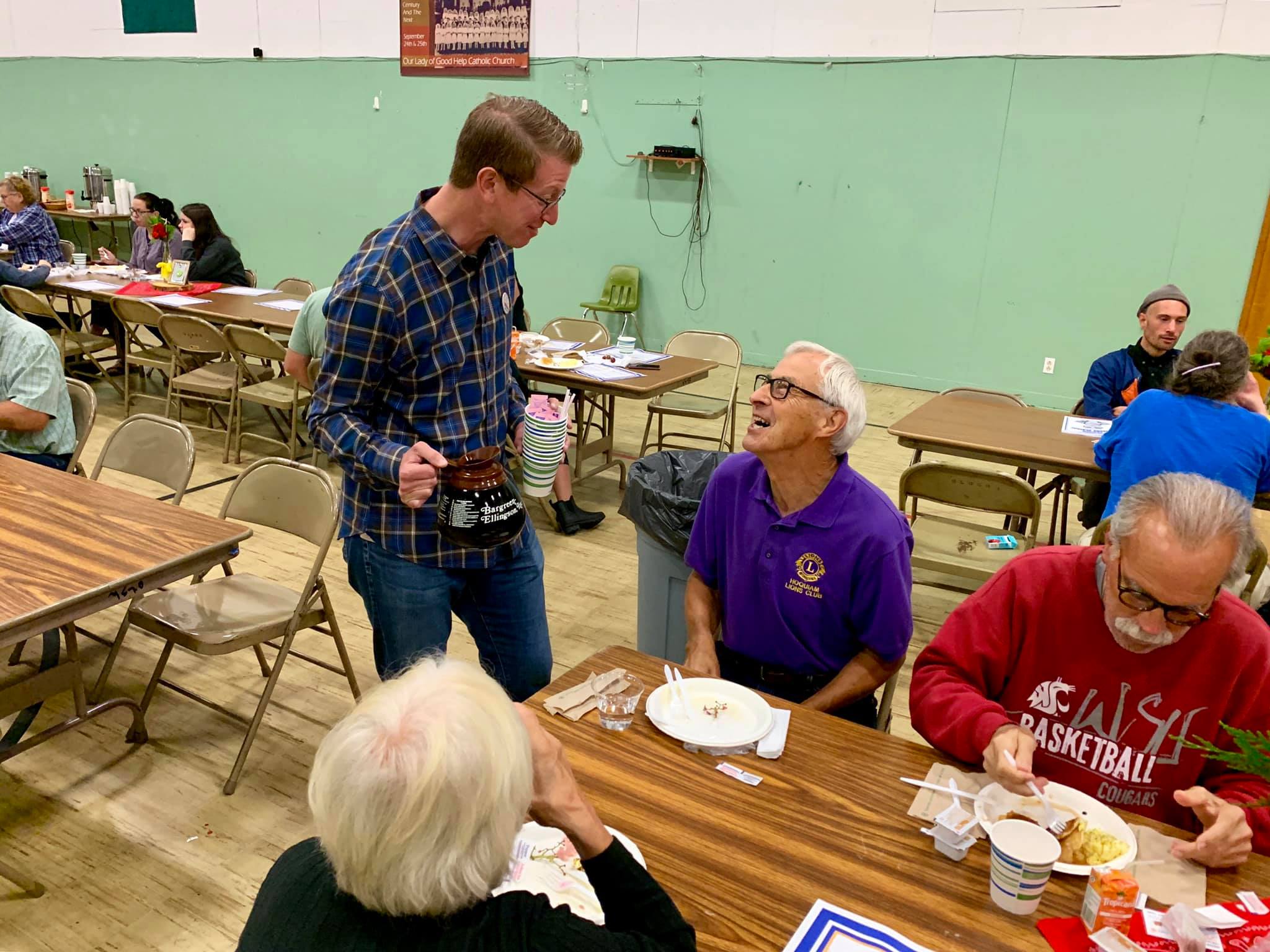Heading Back to DC
Hello Folks -
Following the August District Work Period, coming back to DC feels a little bit like heading back to school. There’s that little bit of nervousness, and then things settle back in. And once you show up, you get a little bit of catching up time, but then the work really begins.
You’ll notice that I referred to it as the “August District Work Period” - not “August Recess.” If you’ve followed me on Facebook or Twitter, you will see that I didn’t treat the time Congress wasn’t in session as a vacation. In fact, just to give you a sense of how I spent my August, I’ve put together these fun facts:
- 4 town halls (in Westport, Kingston, Gig Harbor, and Forks)
- 17 “Kilmer at Your Company” visits
- 4 parades, fairs, and festivals
- 8 business roundtables and economic development meetings
- 20 speeches - with most followed by Q&A (including two groundbreakings, five Chambers of Commerce, three Rotary Clubs, and an oatmeal club)
- 16 tours (including a new VA clinic, two hatcheries, a national lab, the Southern Border of Texas, and a food bank)
- 7 Native American tribes met with
- Over 100 veterans pinned at two Vietnam Veterans Pinning Ceremonies
- 3 events/roundtables focused on housing affordability
- 1 “Kilmer on Your Commute” event where I met with constituents on the ferry
- 2 visits to Naval Base Kitsap
- 4 meetings with or regarding the Olympic Forest Collaborative
- 46 meetings with constituents, nonprofits, and other organizations who wanted to discuss their priorities.
And that’s not even all of it!
We even started to calculate the miles driven in the car to get from pillar to post... but quickly realized the task would take far too long (and potentially damage my calculator). Regardless, it was good to be home and good to see so many of you along the way - to hear your concerns, your ideas, and to talk about what’s on your mind.
I’m taking those conversations from the summer back with me to DC to better represent you and am excited to report that Congress got right to work last week. Read on for details!
Protecting Our Coastal and Marine Economies
Last week, Congress passed three BIG bills that I supported to protect our oceans and the largest wildlife refuge area in the nation. This is of vital importance to our coastal and marine economies and wildlife areas.
First, Congress passed two bipartisan bills that offer sweeping protections for our nation’s coasts, including right here in Washington state, by permanently blocking offshore drilling off the Pacific coast.
In our region, I’ve heard from folks who are really concerned about this issue.
Our commercial and recreational fishermen - who generate billions in economic impact for our state - don’t want to see our fisheries compromised by another disaster. The 17 Native American tribes who have fished throughout the Puget Sound watershed since time immemorial don’t want to see our coastline exposed to these harmful and polluting activities. Our shellfish growers - who support roughly 3,200 jobs in our state - don’t want to see their jobs threatened, as they saw how the Deepwater Horizon devastated Louisiana’s coastal economy. Coastal towns including Ocean Shores, Westport, Aberdeen, Hoquiam, Montesano, Long Beach, and Ilwaco have passed resolutions saying they don’t want it.
With that in mind, it’s safe to say, Washington can be marked as “opposed” to offshore drilling - and I was proud to vote for these bills. They matter to our economy, to our region’s identity, and to the survival of critical species like the Southern Resident Orca.
In addition, Congress passed a bipartisan bill I supported to prohibit oil and gas exploration and production in Alaska's Arctic National Wildlife Refuge (ANWR). For nearly 40 years this ban was in place to protect critical wilderness areas, and I was proud to vote in favor of reinstating that ban.
Building a Wall on the Backs of our Military
You might have seen in news outlets across the region that the Trump Administration recently announced its plans to raid the military construction budget and take $3.6 billion from previously appropriated funds to pay for a wall at America’s southern border.
This action eliminates funding for 127 military construction projects across the country, including an $89 million military construction project right here in the region at Naval Base Kitsap.
The project at Naval Base Kitsap includes the construction of a pier that supports the Maritime Force Protection Unit, which protects submarines and their crews on the way to and from the base. This project, which has the potential to create jobs in Kitsap County, supports critical missions that protect America.
Now I want to back-up a second to provide a full picture for this action - and how things are usually done.
Each year, the Appropriations Committees in the House and Senate pass legislation that lays out how federal agencies can spend your money. Our Founding Fathers thought it was important enough to state in the Constitution that “no money shall be drawn from the treasury” unless specially authorized in a law made by Congress. This is why it’s often said that Congress holds the “power of the purse.” Since the early days our republic, parties from both sides of the aisle have worked together to make decisions on federal spending.
Each year, one of the areas that gets bipartisan support is the military construction budget. Military construction money finances projects ranging from schools and child care facilities for servicemembers and their families, to repairs and reconstruction for facilities after natural disasters, to new projects like the one at Naval Base Kitsap to support Navy operations.
The project at Naval Base Kitsap had been identified by the Department of Defense as important to our national security and was included in a spending bill that was supported by Democrats and Republicans and signed by the president.
I’ve supported comprehensive, bipartisan plans to reform the nation’s immigration system and to better secure the southern border, and I’ll continue to work toward those ends. But I cannot support the President’s efforts to divert funds and delay projects needed to protect our national security.
Those of you who read my newsletter regularly know that I’m not a partisan bomb-thrower. But what is happening here is wrong. The president made a political pledge to build a wall and have Mexico pay for it. He didn’t say he would build a wall and have our military families pay for it. He didn’t say he would pay for a wall by defunding eight schools on military bases. He didn’t say he’d have our sailors pay for it. He didn’t say he would erode national security to pay for it.
It’s not right. In the weeks ahead, Congress will revisit this issue through the appropriations process. Please know that I’ll continue doing all I can to ensure our service members have the resources they need and to ensure that we are creating new economic opportunity in our region.
Reforming the Federal Elections Commission
As some of you may recall, I’ve been working for a long time on a bipartisan effort to reform the Federal Election Commission (FEC) to strengthen the agency’s ability to keep politicians from cheating. The FEC was set up after Watergate to be the referee - to blow the whistle on political candidates and interest groups that cheat our federal campaign finance system.
In recent years, that referee has become somewhat ineffectual (not unlike the referees from the 2005 Super Bowl that messed over the Seahawks... it was really satisfying to get revenge against the Steelers yesterday).
Unfortunately, since I last wrote, the referee has now completely left the field. The FEC no longer has a quorum - meaning it can’t meet, issue fines, complete investigations, or do many of the things needed to protect the integrity of our elections.
I’ve been all over our region, and I’ve never heard anybody anywhere say: “You know - let’s make it easier for politicians to cheat.”
Following the news of the FEC becoming next to inoperable, I took to the pages of the Seattle Times to share some ideas regarding how to fix it - and why Congress should move to pass the bipartisan legislation that I wrote. You can read my op-ed here.
Holding More Town Halls!
Over the last two weeks, I finished another series of town halls - with in person town halls in Gig Harbor, Forks, and over the telephone for anyone and everyone in the region who could join. In total, I held four town halls in the past month in all different parts of the district and one over the phone (on top of town halls earlier this year in Tacoma, Poulsbo, Belfair, Port Angeles, Quilcene, Montesano, and on Facebook).
These town halls are important to ensure that I’m hearing directly from you about what matters to you most. And all-in-all, I just want to say thank you. Thank you for sharing your personal stories, sharing your ideas, sharing your frustrations, and sharing what you want from your federal government. That helps me be a better advocate for you as we work to make the government more responsive to your needs.
Working for You
Touring New Health Care Facilities
It was great to take a hardhat tour of the new clinic at Mason General Hospital. It’s really exciting to see the future of health care in Mason County - and to meet so many of the folks making it happen.
Touching Base with Regional Business Leaders
I really appreciated the opportunity to sit down with a number of businesses doing great work in Jefferson County. We discussed what folks need to expand their operations and to keep employing people in our neck of the woods.
Celebrating Loggers’ Playday
It was my 7th year in a row at the Loggers’ Playday festivities in Hoquiam! From the parade, to the street fair, to the famous pancake feed - it was great to see so many familiar smiling faces.



Protecting the Sound
It was great to meet with Lucas Hart and Alan Clark from the Northwest Straits Commission to talk about the awesome work being done in the region to conserve marine ecosystems and how I’ve been fighting in Congress to get more funding for Puget Sound recovery. Thanks for all you do!
Honoring Our Veterans
It was an honor to join nearly 100 members of the Forks community to say thank you to our Vietnam Era Veterans and their families at a recent pinning ceremony. I’m grateful for the partnership of those who helped put this event together and to so many of you who showed up. Many thanks to the City of Forks, Peninsula College, the American Legion Post 106, Boy Scout Troop 4467, and the Veterans of Foreign Wars Post 9106 for helping to make the event happen! And most importantly, thanks to all the people who came to say thank you to our veterans! They deserve it!


Seeing Our Craftsmen-and-Women in Action
It was an honor to attend the largest boat festival in North America in Port Townsend! There were 250+ vessels, amazing presentations, and an awesome sense of community spirit. Thanks to the Northwest Maritime Center's fearless leader, Jake Beattie, for showing me around!


Ok, that’s it for now. As always, I’m honored to represent you.
Sincerely,
Derek Kilmer
